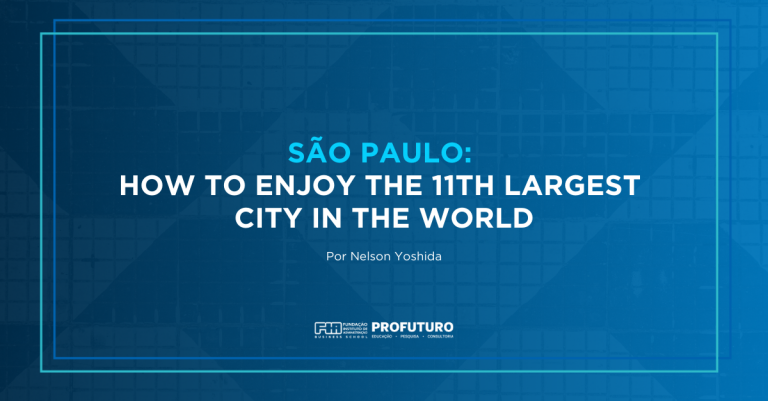
I gladly agreed with the mission to write an article about São Paulo because I thought it would be great to do it and an easy task. What could be difficult regarding this topic? I thought, naively.
Then, every moment I had I used to think about ideas on how to get inspired to write down this article. During an espresso coffee, while driving to and from work, while jogging (which is a moment of inspiration for me), and of course during the moments I scheduled on my calendar app to do it exclusively.
You can’t imagine how unproductive I felt. I had many ideas, and no one evolved to become a minimum scratch of something worthy of appreciation from you. Anyway, as much as I feel these words still lack quality, here goes my vision about São Paulo.
I start this article with a topic not directly connected to the city.
Here comes first a recognition that I have to work on my LinkedIn profile. Yes, I know it needs some dedication to updating overall information.
That said, some of my network Linkediners (if there is such a word) might have concluded that I’m kind of an academic coordinator at FIA Business School at São Paulo – Brazil. If you have come to this conclusion, you’re right. I’m the academic coordinator of the Americas MBA. However, so far I haven’t updated my LinkedIn profile to display this information. Doing it would be easy and fast. It boggles my mind why I just don’t do it.
“Isn’t it amazing how we tend to postpone some things that we value as important? Things that we just consider they can be done at any time in the future, but in the end, we never actually do it properly.
But, what does the human nature of postponing ongoing activities has to do with São Paulo?
Many things much more than we think.
Think about this core question: What to say about São Paulo?
I could make a list, choose an emphasis on a specific area, and describe item by item to provide useful information on that area. But I have to be honest, there are tons of articles on the internet that are excellent sources of information about São Paulo.
Admittedly, I don’t really feel I’d be good to write an article with that approach.
Alternatively, I thought about discussing the missed opportunities that we tend to create because of the attitude of taking for granted what we have in a city like São Paulo. This is the major mistake that leads me to miss opportunities to get to know better the city where I live.
So, here’s the journey to go through. I’ll provide many different answers to the question above, and talk about the insights within them.
1) First answer: ‘São Paulo is the place where you have everything but time,’ and this definition may apply to any other big city in the world. But hey! Do we actually lack time, or do we use this statement just to justify why we postpone many exciting things that we could do here?
A bit of both, for sure. On the one hand, time is the most expensive asset in São Paulo. A typical ‘paulistano’ would understand the meaning of the phrase ‘If you can go to work on foot, you’re a millionaire.’
Here goes another angle of vision regarding this phrase. Does it make sense you postpone something that you’d be willing to do because supposedly you don’t have time?
If you’re thinking to live in São Paulo for a while, come and answer ‘no’ to this last question. You can’t imagine how powerful this attitude is. In less than six months you’ll do much more things than most ‘paulistanos’ wish to do but haven’t done because ‘we don’t have time.’
I’ll give you an example from my experience that shows this objective is achievable. Our students who come from abroad for the Accelerated International MBA, have done things in São Paulo, which have been in my wishlist for years, and I haven’t accomplished yet. And they live here for just a bit more than one year. Yes, one year and two months, roughly.
Now, you may be wondering what I would suggest you do if you were living here.
I’d answer ‘I don’t know. But I would tell you, for sure ‘don’t take for granted what you have where you live!’. These are powerful words, fine-tune your attitude to get the most from the city where you live.
2) Second answer: ‘São Paulo is the city where time relativeness moves according to your attitude.’
What do I mean with that? One can think he/she doesn’t have time to do wishful things, while another one, with the same time constraints of the first one, would think precisely the opposite way. The first one would not do it, the second one would. The difference is in the attitude.
Of course, some constraints play critical roles, and I don’t mean to ignore their relevance. I’m writing this text here to highlight the benefits of the attitude towards a proper application of time relativeness perception. Let’s be surprised by what we can do by adopting this approach. Believe me, this is a great attitude.
Here in São Paulo, there is the Museu de Arte de São Paulo (MASP), which ‘paulistanos’ like to claim to be the most complete art collection of the southern hemisphere. At MASP there is a painting of Renoir that is amazing. I won’t name it because if you have the chance to visit MASP, you’ll know which one I’m talking about. Believe me, you’ll know it.
Attitude, that’s the key.
3) Third answer: ‘São Paulo is the city of chaos.’
As in the Cambridge Dictionary: Chaos is a state of total confusion with no order.
Consider this, for most of those who come from abroad, especially from developed countries, the first impression may be an undeniable confirmation of this definition.
Eleven million people, plus six million more who live in the metropolitan area, can generate lots of services overload. Nevertheless, services work in their own way and are not as close as chaos situation. Chaos would be no services available. As you get used to how they work, planning ahead allows you to overcome the limitations and make the best use of the services with good outcomes.
Not once, but for many times I got myself surprised by our students from abroad, who with only a couple of months living here apply solutions to move around and enjoy the city that I couldn’t even imagine. There are bicycle and electric scooters sharing services, pre-paid bus, subway, and trains RFID cards. Apps like Uber and for cab/taxi services, car sharing services, a full supply of food delivery services that work very well. There are many conveniences around here.
4) Fourth answer: “São Paulo is the city where traffic is the worst.”
Well, as much as the traffic sometimes can be awful here, it doesn’t come close to the worst cities around the world on this topic. For people who drive private cars, the situation is not good, though. Public transportation has a priority in the streets, with special lanes and preferences in the transitions.
Taxis can share the bus lanes so that they can go faster than private cars.
Waze is a reality here, people adopted it as a day-by-day app to save time, and in collaborative action, have made the traffic much better.
Uber is also available here, and drivers also cooperate in sharing traffic avoidance news.
Some drivers may look like they are mad, others, on the contrary, may show an unexpected kindness that doesn’t fit a big city. But they are not aliens, they are people who have concluded that cooperation is the only way to cope with the chaos trend. And believe me, they are growing in numbers.
Subway service is not as spread as the citizens would like it to be. But where it’s available, it works fine. It’s clean, and the frequency of compositions is quite fair. Rush hours are not good, though, because it’s too much crowded. Let’s not forget, seventeen million people live in the metropolitan area, which overloads the transportation system in the peak hours. If you’re able to avoid the rush hours, you can offset the trouble. If you’re not, consider the different routes between the lines because you may divert the overloaded lines. Though, you may have an increase in the time to commute.
Trains are on a pair or a little worse than subway service.
Some people decide to commute later in the evening, doing a course or just enjoying what the city has to offer.
In summary, let’s agree that São Paulo is not the city where traffic is the worst, instead maybe ‘São Paulo is the city where traffic is an opportunity generator.’
Yes, I agree it’s not for everyone to think this way.
5) Fifth answer: ‘São Paulo is the city where an unadvised person can regress to the average of taking everything for granted.’
This is maybe the main factor that dominates most people in São Paulo. I include myself in the list.
You have almost everything here, but the sense of limited time makes you feel out of control to do what you have or want to do. Most part of everything you have and could do here, you tend not to do because of the sense of limited time.
Let’s not forget, time relativeness perception is attitude dependant, and we tend to use this sense to postpone the good things we could do here. This attitude doesn’t come just because of time restriction. It comes from the fact that when you live in a place like São Paulo, you tend to take for granted everything you have in the city.
‘I can do it whenever I want because it’s there, it’s close by, it is available at any time I want. So why rush?’
Thinking through this angle of view, it sounds reasonable, doesn’t it? But here lies the ugly truth, when we think and act like this, we don’t actually live in the place, we are just temporarily habiting that place. The years come and go, and we don’t even regret the missed opportunities because the value we attribute to them is underestimated.
I’ll give an example. Four years after I moved to São Paulo, I had a couple of weeks to go abroad for vacation. I visited Oslo, in Norway, and one thing I was strong-minded to do is to see Edvard Munch’s painting – The Scream.
I visited Munch’s museum and decided to see the painting at the end of the visit. Like we’re used to saying in Brazil, the painting was the ‘cherry of the cake.’
I saw all the art pieces of the museum, which I recommend you to visit if you have the opportunity to go to Oslo. Eventually, I came close to where the painting is typically located, and what did I see?
It was not there! Instead, there was a written message that said:
‘The Scream – Edvard Munch, 1910 version: This painting is now under exhibition at the Museum of Art of São Paulo, Brazil (MASP) due to exchange partnership we have with them.’
What? I crossed the Atlantic Ocean all the way, more than 10,500 kilometers, one thing I wanted to do was to see that specific painting. And it was at MASP, in the city I lived?
Are you feeling bad or laughing about my situation? Wait, it gets worse.
I came back to São Paulo, and the knowledge that MASP is in my town made me postpone the visit. When I thought about going there, the painting had gone back to Much Museum in Oslo.
Yes, I know, I sabotaged me as bad as I could.
Again, I lost the opportunity to see the painting, and here in São Paulo, my city.
That version of the painting (Munch had four versions of it) was stolen from the Munch Museum in 2004 and only recovered in 2006.
I can’t count the number of times my friends mocked me for this situation I created for me. The undeniable truth of this example: Never take for granted what you have in your city. Enjoy each of them.
And make no mistakes, make a list of cities where you can have unexpected opportunities, São Paulo will figure in it.
A brief conclusion
In English, among the meanings of the verb ‘to live,’ we have: To reside (inhabit, have a home) and also the sense of being alive, to have a life, enjoying what life has to offer.
While in Portuguese, we have two verbs for each of the meanings. (1) ‘morar’ is to live (inhabit/reside) in the place where your home is, and (2) ‘viver’ is to live (be alive, enjoy life).
If you come to live in São Paulo, you are absolutely welcome! Come and do both: (1) to live (inhabit/reside/have a home) and (2) to live (viver). That’s what a full experience would grant you as a citizen of the world.
Also, let’s keep in touch because maybe you can give me useful insights on how to take the most from living in São Paulo.
Undoubtedly, I can learn from you how to do it.
Thank you.
Professor Nelson Yoshida







